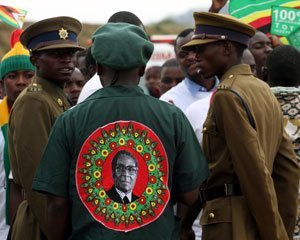
RIGHTS groups have accused Zanu PF of embarking on a crusade to destabilise civil society organisations that it perceives to be critical of its operations ahead of general elections slated for later this year.
BY CAIPHAS CHIMHETE
They said the current onslaught on Non-governmental Organisations (NGOs) by the police was designed to criminalise their operations so that they lose credibility in the eyes of the public and the international community ahead of the polls.
The rights groups said police were implementing a Zanu PF resolution agreed upon at the party’s national congress in Gweru in December last year, where they resolved to shut down organisations that it felt were “diverting” from their mandate.
“Instructs the party to ensure that government enforces the de-registration of errant NGOs deviating from their mandate,” resolved Zanu PF, which has always viewed civil society as an extension of its political rival, the MDC-T.
And true to their resolution, there has been an upsurge of harassment and arrests of human rights defenders since the beginning of this year.
The police recently raided offices of the National Association of Non-governmental Organisation (Nango), an umbrella body of NGOs as well as those of Zimrights, which defends ordinary people’s rights. Zimrights director Okay Machisa is on bail on allegations of tampering with the voters’ roll.
The police have also raided offices of the Zimbabwe Peace Project (ZPP) and seized cellphones, business cards and other electronic data gadgets.
- Chamisa under fire over US$120K donation
- Mavhunga puts DeMbare into Chibuku quarterfinals
- Pension funds bet on Cabora Bassa oilfields
- Councils defy govt fire tender directive
Keep Reading
Other organisations that have been subjected to harassment include the Centre for Community Development in Zimbabwe (CCDZ) and National Youth Development Trust (NYDT).
Members of Women of Zimbabwe Arise (Woza) were last week beaten up by police in Harare and Bulawayo as they conducted their traditional Valentine’s Day protests.
As a result of the onslaught, the operating space for civil society organisations has significantly shrunk. This is particularly so in rural areas where police, district administrators and governors have joined forces to deny them the chance to carry out their duties.
“It is difficult to convene civic education meetings as programme officers are told to seek clearance from police, district administrators and the governor’s office,” said CCDZ in a statement.
Governors are demanding that organisations produce Memoranda of Understanding (MOU) and all the material to be issued out at meetings.
Crisis in Zimbabwe Coalition (CiZC) director Mcdonald Lewanika said the harassment was an attempt by police to stop civil society from scrutinising electoral machinations by Zanu PF, a party accused of rigging previous polls.
“It’s an attempt to criminalise their activities and tarnish their images ahead of elections,” said Lewanika. “The police are just actioning on a resolution by Zanu PF at its December congress where they agreed to close NGOs.”
The harassment flies in the face of President Robert Mugabe, who for the past few months seemed converted, preaching the message of peace and political tolerance.
The United States has also condemned the harassment.
Its Ambassador to Zimbabwe, Bruce Wharton said since November last year, the police had been harassing rights groups through arbitrary detentions, politically-motivated searches and arrests on spurious charges against individuals.
He said some of those targeted were operating within the law. The harassment of rights defenders has not escaped the eyes of the political elite.
Cabinet recently tasked co-minister of Home Affairs, Theresa Makone, to investigate cases of harassment of civil society.
Analysts said violence against human rights must be nipped in the bud because it would spread to other sectors as election dates draw near.
“After destabilising civil society, they will go after members of political parties,” said Lewanika. “So, political parties should not be comfortable because they are in a coalition. Very soon, they will also be under siege as is the norm before any major election.”











